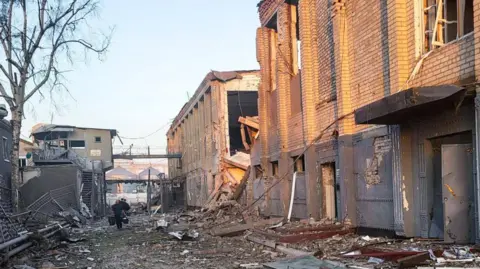In a devastating incident reported just now, Russian forces have launched an airstrike on a prison located in southeastern Ukraine’s Zaporizhzhia region, resulting in the deaths of 17 individuals and injuring at least 42 more. The overnight assault, described as both tragic and shocking, has drawn widespread condemnation from Ukrainian officials and international observers, who squarely blame the invasion of Ukraine by Russia for the ongoing violence and suffering.
According to Ivan Fedorov, the regional leader of Zaporizhzhia, the airstrike involved eight high-explosive aerial glide bombs. In addition to the casualties at the Bilenke penitentiary—where the attack struck the dining hall, administrative headquarters, and a quarantine area—the surrounding residential neighborhoods also sustained significant damage. This incident highlights a continuation of hostilities in an area that, while claimed by Russia since the annexation in 2022, remains largely under Ukrainian control.
Ukrainian President Volodymyr Zelensky voiced strong criticism of Russia’s actions, labeling the strike as a “deliberate attack” on a correctional facility and expressing concern over the loss of lives during a period when a ceasefire could have been feasible. His condemnation underscores the tragic implications of targeting places of detention, emphasizing that inmates retain their rights under international law, even in times of conflict.
In a broader context, the ongoing conflict has escalated since Russia’s full-scale invasion began last year. The Zaporizhzhia region has frequently been a focal point of military engagements, with various airstrikes and ground assaults reported. The Ukrainian Ministry of Justice highlighted that all of those killed and wounded in the prison strike were inmates—a grim reminder of the human toll of warfare.
Amid these alarming developments, U.S. President Donald Trump issued a stark ultimatum to Moscow, warning that Russia must reach a ceasefire within about ten to twelve days or else face severe economic sanctions. During a media interaction in Scotland, Trump indicated that he would announce further details about this ultimatum soon, prompting reactions from both Ukrainian officials and observers on the international stage.
Zelensky expressed appreciation for Trump’s statements, calling them “very important” and criticized Russia for what he described as a waste of time in negotiating peace. Despite diplomatic pressures, the violence continues, as recent reports indicate additional drone and missile attacks across Ukraine, particularly in the eastern Dnipropetrovsk region, resulting in more casualties.
One specific attack in the industrial city of Kamyanske left two individuals dead and several more injured, highlighting the pervasive danger that civilians face amid the ongoing strife. This escalation of violence is compounded by Moscow’s recent claims of capturing territory in Ukraine, specifically mentioning the village of Maliyevka, which Ukraine has adamantly rejected.
In a response to the chaotic situation, there were also reports from Russia indicating that Ukraine had conducted drone strikes overnight in their Rostov region, resulting in at least two fatalities from separate incidents. This ongoing cycle of violence illustrates the severity of the conflict and the complex web of retaliatory actions between the two nations.
As the situation develops, both national and international authorities continue to advocate for humanitarian protections amidst the chaos of war, particularly articulating the rights of those detained and advocating for immediate relief measures for the affected populations. The humanitarian crisis in Ukraine remains poignant, as do the calls for peace and a resolution to the conflict that has already taken a heavy toll on both military and civilian lives.












